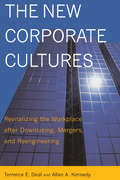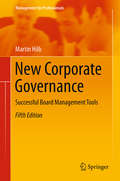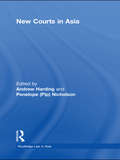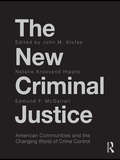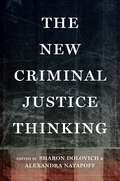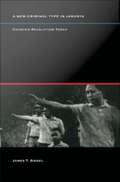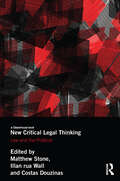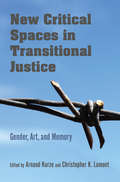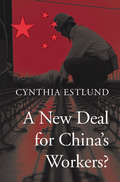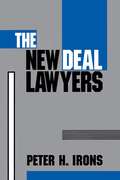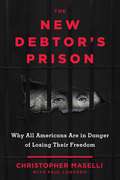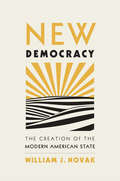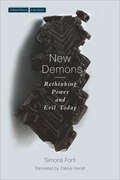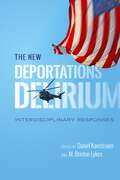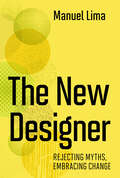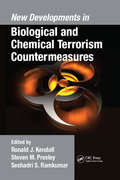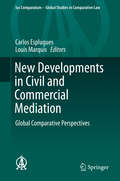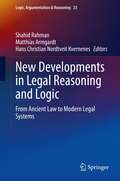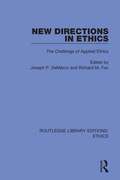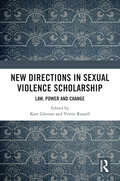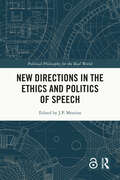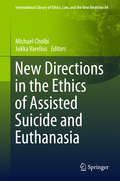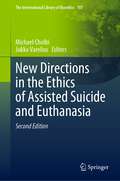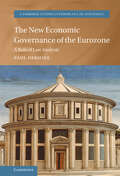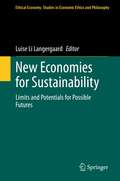- Table View
- List View
The New Corporate Cultures: Revitalizing the Workplace After Downsizing, Mergers, and Reengineering
by Terrence E. Deal Allan A. KennedyThe authors of the hugely influential Corporate Cultures reunite to assess the effects of the last two decades of management trends and to offer new strategies for achieving corporate renewal.
New Corporate Governance
by Martin HilbIn the 5th edition of this successful book Martin Hilb presents an innovative and integrated approach to the theory and practice of corporate governance. Central to this approach is a set of instruments - developed and tested by the author - that can be used by boards to offer effective strategic direction and control to their organizations. The board instruments can be readily applied to the selection, review, remuneration and development of board members, and for conducting board self-evaluations. This new approach to corporate governance is based on four guiding principles: keep it situational, keep it strategic, keep it integrated, and keep it controlled. Together, these principles form the basis of an integrated approach to all key aspects of corporate governance. The main arguments in each section are supported by conceptual models, practical board tools and case studies, making the book ideally suited to board members, senior managers and post-graduate students. This new edition is updated throughout the book and includes a new chapter on mobile integrated board management and documentation information systems.
New Courts in Asia (Routledge Law in Asia)
by Andrew HardingThis book discusses court-oriented legal reforms across Asia with a focus on the creation of ‘new courts’ over the last 20 years. Contributors discuss how to judge new courts and examine whether the many new courts introduced over this period in Asia have succeeded or failed. The ‘new courts’ under scrutiny are mainly specialist courts, including those established to hear cases involving intellectual property disputes, bankruptcy petitions, commercial contracts, public law adjudication, personal law issues and industrial disputes. The justification of the trend to ‘judicialize’ disputes has seen the invocation of Western-style rule of law as necessary for the development of the market economy, democratization, good governance and the upholding of human rights. This book also includes critics of court building who allege that it serves a Western agenda rather than serving local interests, and that the emphasis on judicialization marginalises alternative local and traditional modes of dispute resolution. Adopting an explicitly comparative perspective, and contrasting the experiences of important Asian states - China, Japan, Korea, Malaysia, Vietnam, Brunei, Thailand and Indonesia - this book considers critical questions including: Why has the ‘new-court model’ been adopted, and why do international development agencies and nation-states tend to favour it? What difficulties have the new courts encountered? How have the new courts performed? What are the broader implications of the trend towards the adoption of judicial solutions to economic, social and political problems? Written by world authorities on court development in Asia, this book will not only be of interest to legal scholars and practitioners, but also to development specialists, economists and political scientists.
The New Criminal Justice: American Communities and the Changing World of Crime Control
by John Klofas Natalie Kroovand Hipple Edmund McGarrellCriminal Justice in the United States is in the midst of momentous changes: an era of low crime rates not seen since the 1960s, and a variety of budget crunches also exerting profound impacts on the system. This is the first book available to chronicle these changes and suggest a new, emerging model to the Criminal Justice system, emphasizing: collaboration across agencies previously viewed as relatively autonomous a focus on location problems and local solutions rather than a widely shared understanding of crime or broad application of similar interventions a deep commitment to research which guides problem assessment and policy formulation and intervention. Ideal for use in graduate, as well as undergraduate capstone courses.
The New Criminal Justice Thinking
by Alexandra Natapoff Sharon DolovichA vital collection for reforming criminal justice.After five decades of punitive expansion, the entire U.S. criminal justice system— mass incarceration, the War on Drugs, police practices, the treatment of juveniles and the mentally ill, glaring racial disparity, the death penalty and more — faces challenging questions. What exactly is criminal justice? How much of it is a system of law and how much is a collection of situational social practices? What roles do the Constitution and the Supreme Court play? How do race and gender shape outcomes? How does change happen, and what changes or adaptations should be pursued? The New Criminal Justice Thinking addresses the challenges of this historic moment by asking essential theoretical and practical questions about how the criminal system operates. In this thorough and thoughtful volume, scholars from across the disciplines of legal theory, sociology, criminology, Critical Race Theory, and organizational theory offer crucial insights into how the criminal system works in both theory and practice. By engaging both classic issues and new understandings, this volume offers a comprehensive framework for thinking about the modern justice system. For those interested in criminal law and justice, The New Criminal Justice Thinking offers a profound discussion of the complexities of our deeply flawed criminal justice system, complexities that neither legal theory nor social science can answer alone.
A New Criminal Type in Jakarta: Counter-Revolution Today
by James T. SiegelIn A New Criminal Type in Jakarta, James T. Siegel studies the dependence of Indonesia's post-1965 government on the ubiquitous presence of what he calls criminality, an ensemble of imagined forces within its society that is poised to tear it apart. Siegel, a foremost authority on Indonesia, interprets Suharto's New Order--in powerful contrast to Sukarno's Old Order--and shows a cultural and political life in Jakarta controlled by a repressive regime that has created new ideas among its population about crime, ghosts, fear, and national identity. Examining the links between the concept of criminality and scandal, rumor, fear, and the state, Siegel analyzes daily life in Jakarta through the seemingly disparate but strongly connected elements of family life, gossip, and sensationalist journalism. He offers close analysis of the preoccupation with crime in Pos Kota (a newspaper directed toward the lower classes) and the middle-class magazine Tempo. Because criminal activity has been a sensationalized preoccupation in Jakarta's news venues and among its people, criminality, according to Siegel, has pervaded the identities of its ordinary citizens. Siegel examines how and why the government, fearing revolution and in an attempt to assert power, has made criminality itself a disturbing rationalization for the spectacular massacre of the people it calls criminals--many of whom were never accused of particular crimes. A New Criminal Type in Jakarta reveals that Indonesians--once united by Sukarno's revolutionary proclamations in the name of "the people"--are now, lacking any other unifying element, united through their identification with the criminal and through a "nationalization of death" that has emerged with Suharto's strong counter-revolutionary measures. A provocative introduction to contemporary Indonesia, this book will engage those interested in Southeast Asian studies, anthropology, history, political science, postcolonial studies, public culture, and cultural studies generally.
New Critical Legal Thinking: Law and the Political (Birkbeck Law Press)
by Costas Douzinas Matthew Stone Illan Rua WallNew Critical Legal Thinking articulates the emergence of a stream of critical legal theory which is directly concerned with the relation between law and the political. The early critical legal studies claim that all law is politics is displaced with a different and more nuanced theoretical arsenal. Combining grand theory with a concern for grounded political interventions, the various contributors to this book draw on political theorists and continental philosophers in order to engage with current legal problematics, such as the recent global economic crisis, the Arab spring and the emergence of biopolitics. The contributions instantiate the claim that a new and radical political legal scholarship has come into being: one which critically interrogates and intervenes in the contemporary relationship between law and power.
New Critical Spaces in Transitional Justice: Gender, Art, and Memory
by Christopher Lamont Arnaud K. KurzeSince the 1980s, transitional justice mechanisms have been increasingly applied to account for mass atrocities and grave human rights violations throughout the world. Over time, post-conflict justice practices have expanded across continents and state borders and have fueled the creation of new ideas that go beyond traditional notions of amnesty, retribution, and reconciliation. Gathering work from contributors in international law, political science, sociology, and history, New Critical Spaces in Transitional Justice addresses issues of space and time in transitional justice studies. It explains new trends in responses to post-conflict and post-authoritarian nations and offers original empirical research to help define the field for the future.
A New Deal for China’s Workers?
by Cynthia EstlundChina’s leaders aspire to the prosperity, political legitimacy, and stability that flowed from America’s New Deal, but they are irrevocably opposed to the independent trade unions and mass mobilization that brought it about. Cynthia Estlund’s crisp comparative analysis makes China’s labor unrest and reform legible to Western readers.
The New Deal Lawyers
by Peter H. IronsFrom the perspective of young lawyers in three key New Deal agencies, this book traces the path of crucial constitutional test cases during the years from 1933 to 1937.
The New Debtors' Prison: Why All Americans Are in Danger of Losing Their Freedom
by Paul Lonardo Christopher B. MaselliDebtors’ prisons might sound like something out of a Dickens novel, but what most Americans do not realize is that they are alive and well in a new and startling form. Today more than 20 percent of the prison population is incarcerated for financial reasons such as failing to pay a fine. This alarming trend not only affects the poor, who are hit particularly hard, but also ensnares the millions of self-identified middle-class people who are struggling to make ends meet. All across the country people are being fined and even imprisoned for offenses as small as delinquency on student debt or an unpaid parking ticket. However, there is an insidious undercurrent to these practices that the average person might not realize. Many counties depend on a steady supply of citizens to pay fines and court costs in order to make their budgets. Minor vehicle infractions, by design, can rack up hundreds of dollars in charges that go straight to the city’s coffers. Combine this with the fact that many middle-class people cannot handle an unexpected $400 expense and the general lack of awareness about the risk for being repeatedly jailed for failure to pay court costs, probation, and even per day charges for being in jail and you get an endless cycle of men and women either in debt or in prison for debt. While shocking to some, this system makes up today’s debtors’ prisons. In The New Debtors’ Prison, Christopher Maselli draws from his personal knowledge of the criminal justice system based on his experience on both sides of the prison walls as an attorney as well as a former inmate, to take a hard look at our modern prison system that systematically targets the poor and vulnerable of our society in order to fund the prison-industrial complex.
New Democracy: The Creation of the Modern American State
by William J. NovakThe activist state of the New Deal started forming decades before the FDR administration, demonstrating the deep roots of energetic government in America. In the period between the Civil War and the New Deal, American governance was transformed, with momentous implications for social and economic life. A series of legal reforms gradually brought an end to nineteenth-century traditions of local self-government and associative citizenship, replacing them with positive statecraft: governmental activism intended to change how Americans lived and worked through legislation, regulation, and public administration. The last time American public life had been so thoroughly altered was in the late eighteenth century, at the founding and in the years immediately following. William J. Novak shows how Americans translated new conceptions of citizenship, social welfare, and economic democracy into demands for law and policy that delivered public services and vindicated people’s rights. Over the course of decades, Americans progressively discarded earlier understandings of the reach and responsibilities of government and embraced the idea that legislators and administrators in Washington could tackle economic regulation and social-welfare problems. As citizens witnessed the successes of an energetic, interventionist state, they demanded more of the same, calling on politicians and civil servants to address unfair competition and labor exploitation, form public utilities, and reform police power. Arguing against the myth that America was a weak state until the New Deal, New Democracy traces a steadily aggrandizing authority well before the Roosevelt years. The United States was flexing power domestically and intervening on behalf of redistributive goals for far longer than is commonly recognized, putting the lie to libertarian claims that the New Deal was an aberration in American history.
New Demons: Rethinking Power and Evil Today (Cultural Memory in the Present)
by translated by Zakiya Hanafi Simona FortiAs long as we care about suffering in the world, says political philosopher Simona Forti, we are compelled to inquire into the question of evil. But is the concept of evil still useful in a postmodern landscape where absolute values have been leveled and relativized by a historicist perspective? Given our current unwillingness to judge others, what signposts remain to guide our ethical behavior? Surveying the nineteenth- and twentieth-century Western philosophical debates on evil, Forti concludes that it is time to leave behind what she calls "the Dostoevsky paradigm": the dualistic vision of an omnipotent monster pitted against absolute, helpless victims. No longer capable of grasping the normalization of evil in today's world-whose structures of power have been transformed-this paradigm has exhausted its explanatory force. In its place, Forti offers a different genealogy of the relationship between evil and power, one that finally calls into question power's recurrent link to transgression. At the center of contemporary evil she posits the passive attitude towards rule-following, the need for normalcy, and the desire for obedience nurtured by our contemporary mass democracies. In our times, she contends, evil must be explored in tandem with our stubborn desire to stay alive at all costs as much as with our deep need for recognition: the new modern absolutes. A courageous book, New Demons extends an original, inspiring call to ethical living in a biopolitical age.
The New Deportations Delirium: Interdisciplinary Responses (Citizenship and Migration in the Americas #7)
by Daniel Kanstroom M. Brinton LykesSince 1996, when the deportation laws were hardened, millions of migrants to the U.S., including many long-term legal permanent residents with "green cards," have experienced summary arrest, incarceration without bail, transfer to remote detention facilities, and deportation without counsel--a life-time banishment from what is, in many cases, the only country they have ever known. U.S.-based families and communities face the loss of a worker, neighbor, spouse, parent, or child. Many of the deported are "sentenced home" to a country which they only knew as an infant, whose language they do not speak, or where a family lives in extreme poverty or indebtedness for not yet being able to pay the costs of their previous migration. But what does this actually look like and what are the systems and processes and who are the people who are enforcing deportation policies and practices? The New Deportations Delirium responds to these questions. Taken as a whole, the volume raises consciousness about the complexities of the issues and argues for the interdisciplinary dialogue and response. Over the course of the book, deportation policy is debated by lawyers, judges, social workers, researchers, and clinical and community psychologists as well as educators, researchers, and community activists. The New Deportations Delirium presents a fresh conversation and urges a holistic response to the complex realities facing not only migrants but also the wider U.S. society in which they have sought a better life.
The New Designer: Rejecting Myths, Embracing Change
by Manuel LimaHow to develop an ethical design practice and build a better world.The choices made by designers have a significant effect on the world. Yet so much of the discourse on design focuses on aesthetics rather than ethics. In The New Designer, acclaimed author Manuel Lima aims to change this by challenging common myths and preconceptions about what comprises good design. He argues that designers must take responsibility for the personal, societal, cultural, and environmental impact of their work, rather than simply following a standard template.As he covers fields ranging from graphic design to industrial design to user-experience design, Lima identifies the major steps that designers must take to be a force for good in the world. Rather than sticking to outmoded ideas about perfectionism and individual genius, designers must work together to tackle some of the most challenging questions of the twenty-first century. How do you make room for humanity, with all its wondrous variations, in a society increasingly driven by metrics, algorithms, and profit? How can ecologically responsible designers consider a product&’s entire life cycle and look well into the future? And how can designers better respond to a community&’s local needs while taking advantage of global networks?Blending approaches derived from ethics, psychology, economics, and ecology, The New Designer is a vital, field-changing treatise that will appeal to any reader who seeks to understand design&’s massive influence on the contemporary world.
New Developments in Biological and Chemical Terrorism Countermeasures
by Ronald J. Kendall; Steven M. Presley; Seshadri S. RamkumarA science-based text, New Developments in Biological and Chemical Terrorism Countermeasures presents research that addresses the growing threat of chemical and biological terrorism as well as the need for improvements in the implementation of countermeasures. This new textbook building upon Advances in Biological and Chemical Terrorism Countermeasu
New Developments in Civil and Commercial Mediation
by Carlos Esplugues Louis MarquisBy means of the analysis of more than 20 national jurisdictions of different legal and geographical origin this book provides a general understanding of the developments that civil and commercial mediation is currently undertaking across the world. The book combines 25 national reports with a General Report analyzing the major trends in civil and commercial mediation worldwide. A number of the key variables that make mediation so effective are studied in depth in the book. The concept of mediation, that varies from country to country. Its legal framework and the branches of public and private law in which it is used. The legal condition of the mediation agreement and its relevant conditions of form and content, the responsibilities of the parties in the event that they violate this agreement and the effects of this agreement on potential recourse to the courts or to arbitration, as well as with regard to pending cases. As well as the role played by the mediator, his or her appointment or designation, legal and ethical responsibilities, and the role of institutions in mediation. As well as the mediation process, its applicable rules and principles and its costs are analyzed on comparative basis. The book also pays special attention to the outcome of mediation. The enforceability of the settlement reached both in domestic and cross-border mediations constitutes a basic element for the success of the institution and is thoroughly studied. This volume constitutes a unique instrument for those interested on mediation, either practitioners, judges or academics.
New Developments in Legal Reasoning and Logic: From Ancient Law to Modern Legal Systems (Logic, Argumentation & Reasoning #23)
by Shahid Rahman Matthias Armgardt Hans Christian Nordtveit KvernenesThis book intends to unite studies in different fields related to the development of the relations between logic, law and legal reasoning. Combining historical and philosophical studies on legal reasoning in Civil and Common Law, and on the often neglected Arabic and Talmudic traditions of jurisprudence, this project unites these areas with recent technical developments in computer science. This combination has resulted in renewed interest in deontic logic and logic of norms that stems from the interaction between artificial intelligence and law and their applications to these areas of logic. The book also aims to motivate and launch a more intense interaction between the historical and philosophical work of Arabic, Talmudic and European jurisprudence. The publication discusses new insights in the interaction between logic and law, and more precisely the study of different answers to the question: what role does logic play in legal reasoning? Varying perspectives include that of foundational studies (such as logical principles and frameworks) to applications, and historical perspectives.
New Directions in Ethics: The Challenges in Applied Ethics
by Joseph P. DeMarco Richard M. FoxOriginally published in 1986, this book examines the extent to which existing ethical theory can provide an adequate framework for the resolution of practical moral issues. The contributors, all leading moral philosophers, provide an authoritative and comprehensive account of developments in ethical theory, with emphasis on issues in applied ethics. They explain the dominant ethical theories, survey major field of applied ethics and speculate about the future of ethics.
New Directions in Sexual Violence Scholarship: Law, Power and Change
by Kate Gleeson and Yvette RussellThis edited collection brings together leading and emerging scholars in the important field of sexual violence scholarship. The last ten years have witnessed an international reckoning on sexual violence, typified in the mainstream imagination by the #MeToo movement, acknowledgement of the violence of university campus life, and the overdue recognition of the enduring harms of child sexual abuse. While the state has been forced to respond through law and other political processes, at times revealing its agility and at other times its archaic investment in the past, much of the real work responding to sexual violence and abuse has taken place within communities, and in the personal responses of the individuals writing the scripts of their experiences. This volume explores the nuances of these individual experiences and considers how they are shaped and reflected by intersecting axes of power including gender, race, class, age and able-bodied status. It reflects on law and law reform in the area and suggests new modes and frames through which to explain and understand sexual violence and institutional responses to it. Debates within this contested personal and political arena do not map onto longstanding binaries of liberal and radical feminism, nor conservative and progressive politics. This interdisciplinary volume traces that murky terrain and features some of the leading international scholars writing on sexual violence in English today. This book will appeal to scholars and students across the broad disciplines of law and legal studies; criminology; gender studies; political science and sociology.
New Directions in the Ethics and Politics of Speech (Political Philosophy for the Real World)
by J. P. MessinaThis book features new perspectives on the ethics and politics of free speech. Contributors draw on insights from philosophy, psychology, political theory, journalism, literature, and history to respond to pressing problems involving free speech in liberal societies. Recent years have seen an explosion of academic interest in these topics. However, most recent work has focused on constitutional protections for free speech and on issues related to academic freedom and campus politics. The chapters in this volume set their sights more broadly on the non-state problems that we collectively face in attempting to realize a healthy environment for free discourse. The volume’s contributors share the assumption that threats to free speech do not come exclusively from state sources or bad actors, but from ordinary strategic situations in which all may be acting in good faith. Contributors take seriously the idea that our current cultural moment provides plenty of reason to be concerned about our intellectual climate and offer new insights for how to make things better. New Directions in the Ethics and Politics of Speech will be of interest to researchers and students working in ethics, political philosophy, social theory, and law. The Open Access version of this book, available at www.taylorfrancis.com, has been made available under a Creative Commons Attribution-Non Commercial-No Derivatives 4.0 license.
New Directions in the Ethics of Assisted Suicide and Euthanasia
by Michael Cholbi Jukka VareliusThis book provides novel perspectives on the ethical justifiability of assisted dying. Seeking to go beyond traditional debates on topics such as the value of human life and questions surrounding intention and causation, this volume promises to shift the terrain of the ethical debates about assisted dying. It reconsiders the role of patient autonomy and paternalistic reasons as well as the part proposed for medical professionals and clinical ethics consultation in connection with assisted dying, relates the debate on assisted dying to questions about organ-donation and developments in medical technology, and demonstrates the significance of experimental philosophy in assessing questions of assisted dying. This book is ideal for advanced courses in bioethics and health care ethics.
New Directions in the Ethics of Assisted Suicide and Euthanasia (The International Library of Bioethics #103)
by Michael Cholbi Jukka VareliusThis book provides novel perspectives on ethical justifiability of assisted dying in the revised edition of New Directions in the Ethics of Assisted Suicide and Euthanasia. Going significantly beyond traditional debates about the value of human life, the ethical significance of individual autonomy, the compatibility of assisted dying with the ethical obligations of medical professionals, and questions surrounding intention and causation, this book promises to shift the terrain of the ethical debates about assisted dying. The novel themes discussed in the revised edition include the role of markets, disability, gender, artificial intelligence, medical futility, race, and transhumanism. Ideal for advanced courses in bioethics and healthcare ethics, the book illustrates how social and technological developments will shape debates about assisted dying in the years to come.
The New Economic Governance of the Eurozone: A Rule of Law Analysis (Cambridge Studies in European Law and Policy)
by Paul DermineThe Eurozone and the European Union have recently been confronted with a number of existential threats. The sovereign debt crisis and the COVID-19 pandemic have forced European decisionmakers to pass important reforms which have radically transformed the nature and scope of the Union's powers in the field of economic and fiscal policy. As the new economic governance of the Eurozone emerges as the main driver of integration in today's Europe, this book seeks to assess the solidity of the constitutional foundations supporting that system, and its compliance with the Union's core founding value: the rule of law. Using competence allocation, regulatory quality, access to external review and fundamental rights sustainability as analytical benchmarks, this book argues that the recent metamorphosis of Eurozone economic governance has not been accompanied by a parallel strengthening of its constitutional settlement, leading to a problematic misalignment between the Union's action and its governing principles.
New Economies for Sustainability: Limits and Potentials for Possible Futures (Ethical Economy #59)
by Luise Li LangergaardThe edited volume New Economies for Sustainability: Limits and Potentials for Possible Futures brings together a range of alternative views on economy and organization to illustrate different perspectives on how to work towards more sustainable solutions to production, consumptions and economic organization more generally. The book brings chapters from the most renowned scholars in the field, who bring their perspectives on how alternative schools theorize politics, society, organization, nature and ethics in their attempts to develop theories with a strong focus on sustainability. The book aims to contribute with a platform for gathering and collecting these theories in a pluralist economic framework, which can provide a strong alternative voice to mainstream economic theories in sustainability debates.
